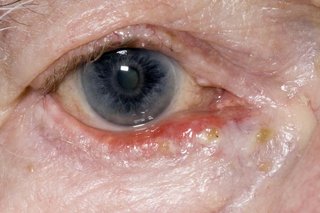Symptoms of ectropion

Ectropion mainly affects your lower eyelid and can happen in 1 or both eyelids at the same time. It's more common in older people.
The main symptoms of ectropion include:
- a drooping and sagging lower eyelid
- a sore, irritated and red eye and eyelid – eyelid redness may be harder to see on brown or black skin
- difficulty closing your eye
- watery eyes
- dry and gritty feeling eyes
It also means you're more likely to get infections like conjunctivitis.
There are other problems that can affect your eyelid. Find out more about eyelid problems.
Non-urgent advice: See a GP if:
- you think you have ectropion
Urgent advice: Ask for an urgent GP appointment or get help from NHS 111 if you have:
- very red eyes (1 or both eyes)
- pain in your eyes
- changes in your vision
- sensitivity to light
- a headache and you feel sick or are vomiting
You can call 111 or get help from 111 online.
Treatment for ectropion
A GP will be able to diagnose ectropion by examining your eye. They may refer you to an eye specialist (ophthalmologist) for further assessment.
Treatment depends on what symptoms you have and what's causing ectropion.
If your symptoms are mild, you may not need treatment.
If you cannot shut your eye properly, treatment may include:
- using eye ointment or drops to soothe your eye and stop it becoming dry
- taping your lower and upper eyelids together to protect your cornea (the clear, outer part at the front of the eye) – your eye specialist will show you how to do this with special skin tape
Try to avoid wiping or rubbing your eyes too much, as this can make ectropion worse. If you need to wipe your eyes, dab them gently and carefully with a clean tissue.
Surgery for ectropion
If ectropion is causing severe symptoms, you may need surgery to tighten the skin and muscles around your eye.
Causes of ectropion
Ectropion is usually caused by aging, as the muscles around your eye become weaker.
Less commonly it can be caused by:
- using eye drops continuously for a long time
- nerve problems or conditions that cause facial paralysis, like Bell's palsy
- a lump, cyst or tumour on your eyelid
- damage to the skin around your eye because of an injury, burn or scarring from previous surgery
Page last reviewed: 17 July 2025
Next review due: 17 July 2028